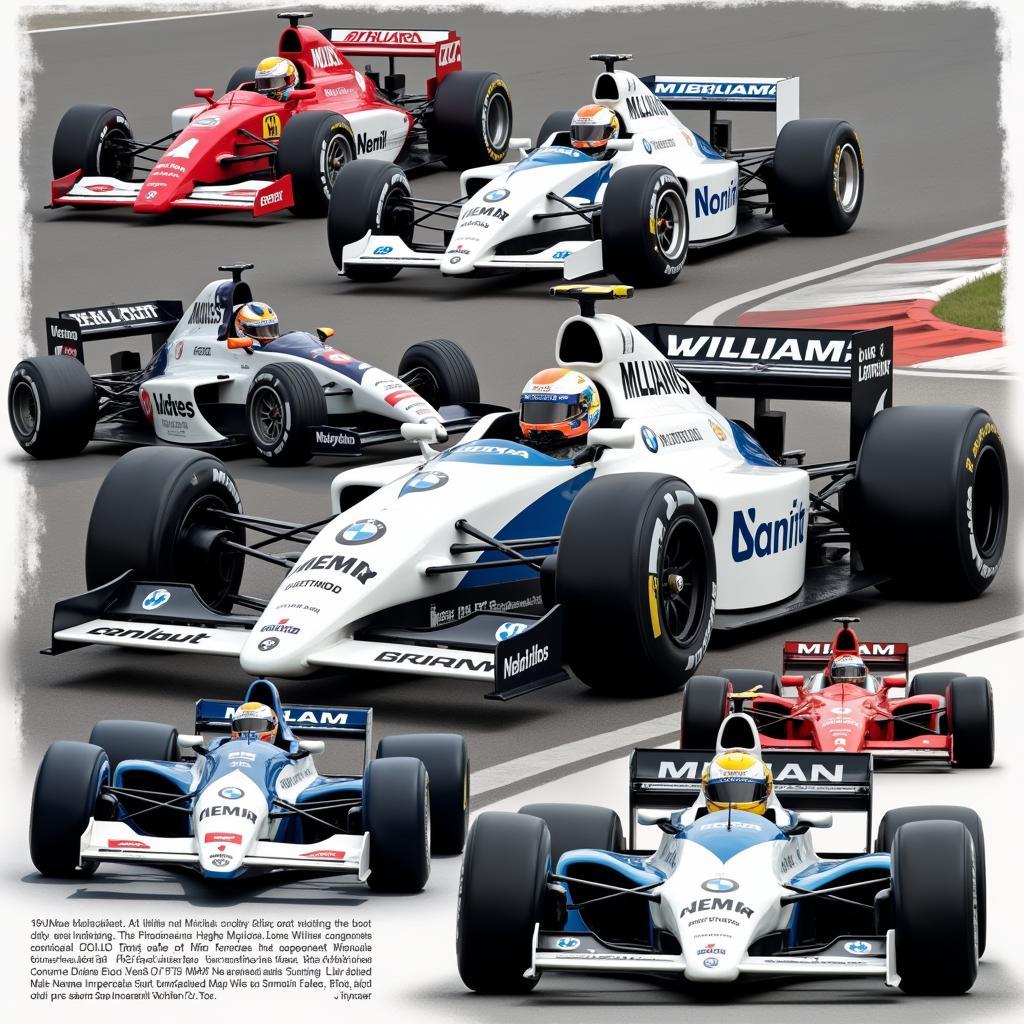The captivating williams bmw v10 f1 sound is a symphony of power and precision, a testament to a golden era of Formula 1 racing. This sound, etched into the memories of motorsport enthusiasts, represents the pinnacle of naturally aspirated engine technology. Let’s delve into the intricacies of this iconic engine and explore the factors that contributed to its legendary status.
Deconstructing the Williams BMW V10 F1 Sound
The distinctive wail of the BMW V10 engine, as heard in Williams F1 cars from 2000 to 2005, was a product of meticulous engineering and a relentless pursuit of performance. The engine’s high-revving nature, reaching up to a staggering 19,000 RPM, played a crucial role in creating this unique auditory experience. This, combined with the firing order of the ten cylinders, produced a complex harmonic structure that resonated with fans worldwide. Furthermore, the lack of turbocharging allowed for a pure, unadulterated sound, unmuffled by the whoosh of forced induction.
What Makes the BMW V10 Engine Sound So Unique?
The BMW V10’s sound signature is a combination of several factors. The engine’s high-pitched scream, a result of its extreme RPM, is unlike anything heard in road cars. This is further amplified by the lightweight construction and the direct exhaust system, which minimize any muffling or dampening of the sound. The distinctive “bark” during gear changes is another characteristic of this engine, caused by the sudden interruption of airflow and fuel delivery.
The Influence of Regulations on the Williams BMW V10 Sound
Formula 1 regulations have always played a significant role in shaping engine design and, consequently, engine sound. During the V10 era, regulations were less restrictive regarding engine capacity and RPM, allowing engineers to push the boundaries of naturally aspirated engine technology. This resulted in engines that produced an incredibly high-pitched and powerful sound.
How Did F1 Regulations Impact the Engine’s Development?
The relative freedom allowed by the regulations during the V10 era encouraged innovation and competition among engine manufacturers. This led to rapid advancements in engine technology and a constant quest for higher RPM and greater power output. The result was the creation of some of the most iconic and distinctive sounding engines in Formula 1 history, including the Williams BMW V10.
The Legacy of the Williams BMW V10 F1 Sound
The williams bmw v10 f1 sound remains a cherished memory for Formula 1 fans. It symbolizes a period of intense competition and technological advancement in the sport. The unique sound of the BMW V10 engine, coupled with the success of the Williams team during that era, cemented its place in motorsport history.
“The BMW V10 was an absolute beast,” recalls Dr. Hans Zimmer, former head of engine development at BMW Motorsport. “Its sound was truly captivating, a testament to the engineering ingenuity of the time.”
Why is the V10 Sound Still So Popular Today?
The continued popularity of the V10 sound can be attributed to its raw, unfiltered nature. It represents a time when Formula 1 engines were pushed to their limits, producing a sound that was both thrilling and evocative. This stands in contrast to the more muted sound of modern turbocharged hybrid engines.
 Williams F1 V10 Legacy
Williams F1 V10 Legacy
Conclusion
The williams bmw v10 f1 sound is a symbol of a bygone era in Formula 1, a time when naturally aspirated engines reigned supreme. Its distinctive high-pitched wail and raw power continue to captivate motorsport enthusiasts to this day. While modern Formula 1 engines may be more technologically advanced, the visceral thrill of the V10 era remains unmatched.
FAQ:
- What is the maximum RPM of the Williams BMW V10 F1 engine? (Around 19,000 RPM)
- Why do V10 engines sound different from V8 engines? (Different firing order and cylinder count create distinct harmonics.)
- When did Williams use the BMW V10 engine? (2000-2005)
- Are V10 engines still used in F1? (No, they were replaced by V8s and then hybrid turbo V6s.)
- What is the significance of the V10 era in F1? (It’s considered a golden age for naturally aspirated engines.)
- What contributes to the unique sound of the BMW V10? (High RPM, lightweight construction, direct exhaust system.)
- How did F1 regulations influence the development of the V10 engine? (Less restrictive rules allowed for higher RPM and greater power output.)
Need help with your car’s diagnostics, programming, or remote software installation? Contact us via Whatsapp: +1 (641) 206-8880, Email: CARDIAGTECH[email protected] or visit us at 276 Reock St, City of Orange, NJ 07050, United States. Our 24/7 customer support team is ready to assist you.
